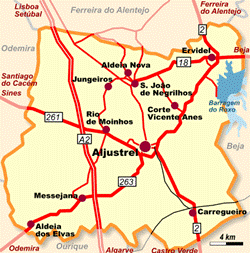

Aljustrel

Aljustrel is a town that belongs to the district of Beja, old province of Baixo Alentejo. The municipality has 455,7 sq. km of area and about 11 800 inhabitants in 5 communes. It is a very poor municipality, with an economy based in agriculture and mining industries, although these are facing a huge crisis right now, thus there is a lot of unemployment there.
Inhabited
since remote times, Aljustrel became an important centre when its wealth in
pyrites became known, and the mines were already explored in the 1st century BC
by the Romans, who named the town Vipasca.
![]() Over
the ages, the mining industry has marked the county's economy and cultural
identity, and its history is documented by the strange structures rising at the
mining zone (a sort of towers used to take the ore and miners up and down), set
in a harsh and fascinating scenery, and by the local Mine Museum, dedicated to
the archaeological, traditional and industrial legacy.
Over
the ages, the mining industry has marked the county's economy and cultural
identity, and its history is documented by the strange structures rising at the
mining zone (a sort of towers used to take the ore and miners up and down), set
in a harsh and fascinating scenery, and by the local Mine Museum, dedicated to
the archaeological, traditional and industrial legacy.
![]() The
county's landscape is characterized by the vast and rolling wheat plains of the
Alentejo, except around Ervidel, surrounded by fertile and irrigated fields due
to the Roxo Dam, which also offers visitors the possibility of enjoying water
sports and fishing, as well as a picnics park. Ervidel is also known for its
wines and typical taverns.
The
county's landscape is characterized by the vast and rolling wheat plains of the
Alentejo, except around Ervidel, surrounded by fertile and irrigated fields due
to the Roxo Dam, which also offers visitors the possibility of enjoying water
sports and fishing, as well as a picnics park. Ervidel is also known for its
wines and typical taverns.
![]() Another
site worth visiting is Messejana, boasting of an illustrious past portrayed by
the ruins of a medieval castle, noble manors, a Manueline pillory and the nearby
church of Our Lady of Assumption.
Another
site worth visiting is Messejana, boasting of an illustrious past portrayed by
the ruins of a medieval castle, noble manors, a Manueline pillory and the nearby
church of Our Lady of Assumption.
![]() At
the seat of the county, the most emblematic site is the sanctuary of Our Lady of
the Castle, crowned by a chapel dating from the 12th century.
At
the seat of the county, the most emblematic site is the sanctuary of Our Lady of
the Castle, crowned by a chapel dating from the 12th century.
![]() It
is also worth visiting the Mother Church, with precious decorated tiles, and the
Miserichord Church, in the Renaissance style.
It
is also worth visiting the Mother Church, with precious decorated tiles, and the
Miserichord Church, in the Renaissance style.
![]() At
table, the traditions of the Alentejo cooking are preserved with many dishes
including ingredients such as bread, olive-oil, coriander and garlic and
offering typical specialities such as gaspacho (a tomato soup always
served cold), carne de porco ā alentejana (a curious combination of pork
and clams) or ensopado de borrego (a stew of young lamb with bread).
At
table, the traditions of the Alentejo cooking are preserved with many dishes
including ingredients such as bread, olive-oil, coriander and garlic and
offering typical specialities such as gaspacho (a tomato soup always
served cold), carne de porco ā alentejana (a curious combination of pork
and clams) or ensopado de borrego (a stew of young lamb with bread).
Fatima Pilgrimages Index Espaņol English Index Viajes